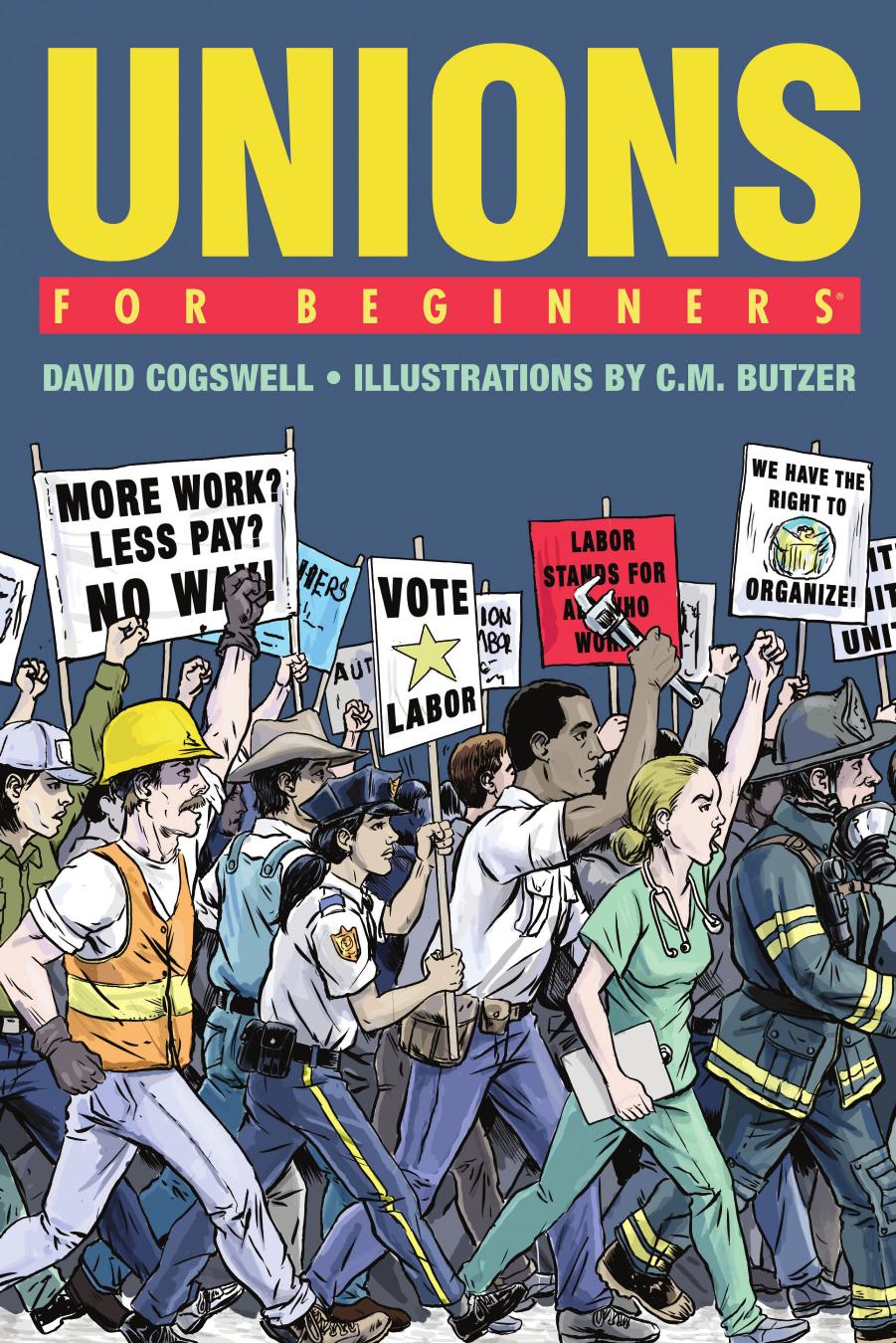Unions For Beginners by David Cogswell

Author:David Cogswell [Cogswell, David]
Language: eng
Format: epub, pdf
ISBN: 978-1-934389-78-2
Publisher: For Beginners
Published: 2012-10-15T16:00:00+00:00
Debs and The Strike of 1877
The railroads consolidated in the 1850s and became increasingly harsh and predatory. Wages were cut. Workdays were extended. Strikes among the railroad workers began to break out, but most were crushed by the railroads.
Debs worked hard and rose quickly to leadership status in the union. But the BLF was not meeting the needs of the workmen and membership was declining. The workers wanted a union that would stop the wrecks, raise pay, shorten hours and get the boss off the workers’ backs. The union faded in influence and by the time the workers did mount a strike against the railroad in 1877, the union had little to do with it. The Pennsylvania and Baltimore & Ohio railroads had posted notices of pay cuts and the workers revolted. (see below)
The failure of the Railroad Strike of 1877 had a profound effect on Debs. By then he was a national officer in the BLF. He blamed the railroads’ oppression for forcing the strike to happen, but was even more concerned with the violence and lawlessness that took place during the strike. In a speech to BLF’s national convention soon after the incident, he proclaimed that the union did not encourage such behavior.
The depression of 1873 put farmers in the squeeze between falling prices for their goods and increasing costs in mortgage rates, farm equipment and price gouging by the railroad. The unions had been effectively squashed by the railroads and working people were looking to the political system for some relief. Debs was swept into the fervor of the moment. He distinguished himself as a powerful public speaker for the causes of the poor and oppressed and the Democratic party. Local Democratic leaders noticed his talent and offered him the Democratic nomination for Congress. He declined because he didn’t want to leave his family. But the next year he was elected city clerk of Terre Haute. Terre Haute’s West End was a center of ginmills and prostitution. One of Debs’ duties was to go after the fines owed by prostitutes who had been picked up. But Debs couldn’t bring himself to come down hard on the struggling working women when the cops had been ineffective in bringing the pimps and racketeers to justice.
While city clerk, he kept his association with the BLF and soon found himself challenged to save the organization from collapse, which seemed eminent. The strike of 1877 had all but destroyed the BLF. While the officers were trying to think of ways to save the union, the railroads were looking for ways to destroy it once and for all. But Debs’ courage and resolve never faltered.
One day a BLF officer was thrown out of the office of the vice president of the Pennsylvania Railroad. When Debs heard about it, he took the officer with him from Terre Haute back to the president’s office in Columbus. When they walked into the office the vice president said, “Before we go any further I want you to know, Debs, that I don’t give a God damn for the Brotherhood of Locomotive Firemen.
Download
This site does not store any files on its server. We only index and link to content provided by other sites. Please contact the content providers to delete copyright contents if any and email us, we'll remove relevant links or contents immediately.
| Air & Space | Construction |
| Disability | Educational Law & Legislation |
| Labor Law | Maritime |
| Military | Personal Injury |
| Sports |
Last Narco by Beith Malcolm(1556)
Steroids: History, Science, and Issues by Standora Joan E.; Bogomolnik Alex; Slugocki Malgorzata(1506)
A Practical Guide to International Arbitration in London by Hilary Heilbron(1424)
Adrift by Steven Callahan(1348)
40 Days and 40 Nights by Matthew Chapman(1336)
Reclaiming History by Vincent Bugliosi(1328)
Introduction to the study and practice of law in a nutshell by Kenney F. Hegland(1316)
The Nuremberg Interviews by Leon Goldensohn(1296)
Poisoned by Jeff Benedict(1295)
Persuasion by Owner(1290)
Dog Company: A True Story of American Soldiers Abandoned by Their High Command by Lynn Vincent & Roger Hill(1252)
The New Whistleblower's Handbook by Stephen Kohn(1213)
Lincoln's Code by John Fabian Witt(1184)
Eichmann in Jerusalem by Hannah Arendt(1156)
Kafka's Last Trial by Benjamin Balint(1156)
Japanese War Crimes during World War II: Atrocity and the Psychology of Collective Violence by Frank Jacob(1091)
A Passing Fury by A. T. Williams(1065)
Dog Company: A True Story of American Soldiers Abandoned by Their High Command by Roger Hill & Lynn Vincent(1054)
A Court of Refuge by Ginger Lerner-Wren & Rebecca A. Eckland(1032)
